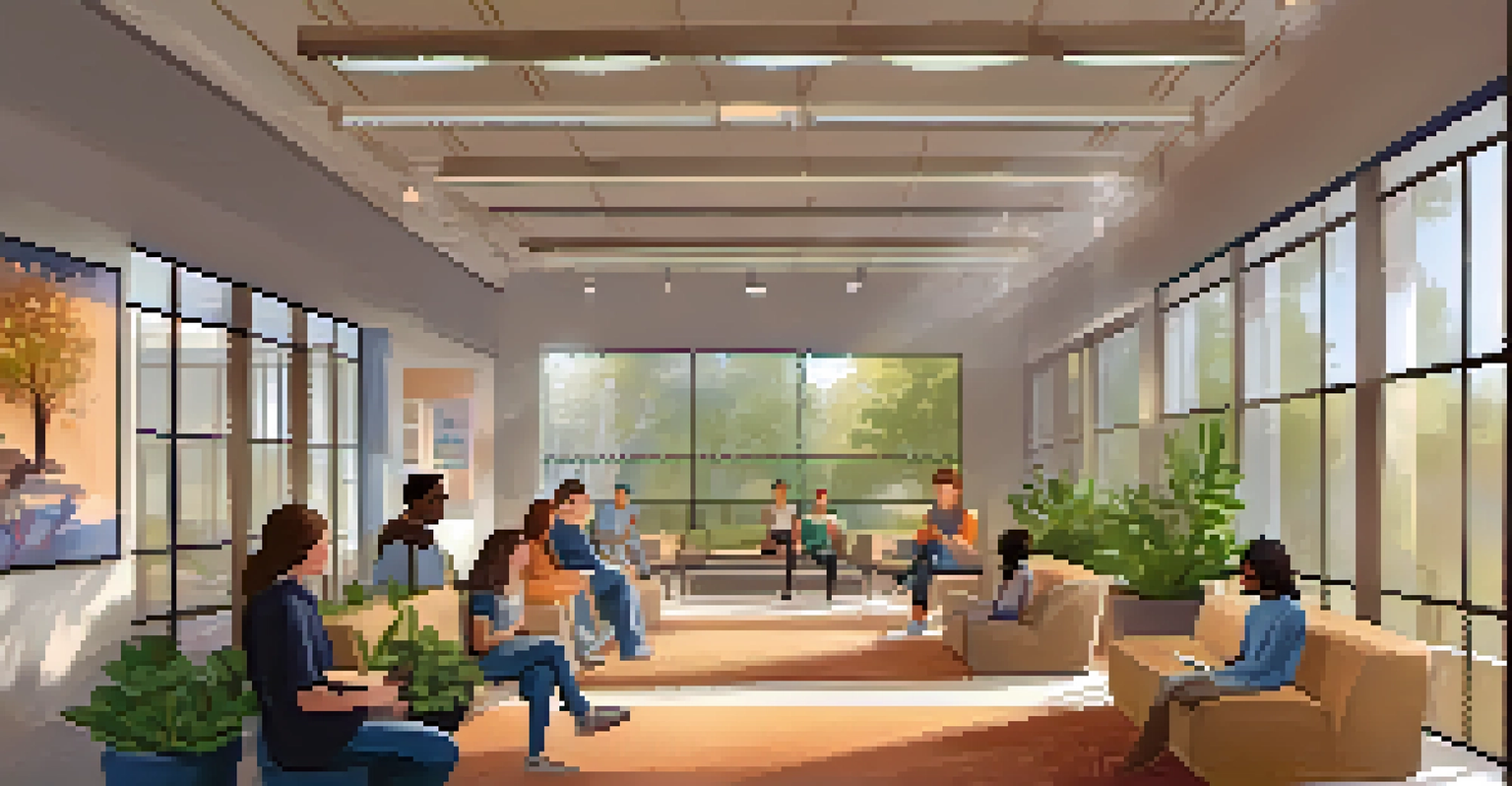Future Trends in Nevada's Higher Education: What to Expect

Increased Focus on Online Learning and Flexibility
As we look ahead, one of the most significant trends in Nevada's higher education is the rise of online learning. Institutions are increasingly recognizing the need for flexible options that cater to diverse student needs. This shift allows students, especially those balancing work and family, to pursue degrees without the constraints of traditional classroom settings.
Education is the most powerful weapon which you can use to change the world.
Moreover, online programs are not just about convenience; they also offer a breadth of courses that may not be available on campus. For example, students interested in niche fields can find specialized programs that fit their career aspirations. This accessibility opens doors for many who may have felt limited by geographical or logistical barriers.
As technology continues to evolve, we can expect even more innovative online learning experiences, such as virtual reality classrooms and interactive simulations. These advancements promise to enhance engagement and provide students with practical skills that are highly valued in the job market.
Emphasis on Workforce Development and Career Readiness
Nevada's higher education institutions are increasingly aligning their programs with workforce demands. This trend is driven by the need for graduates who possess not only academic knowledge but also practical skills that employers seek. By collaborating with local businesses, universities can tailor curriculum that directly addresses industry needs.

For instance, initiatives like internships and co-op programs are becoming more prevalent, providing students with hands-on experience. This real-world exposure is invaluable, as it helps students build networks and understand workplace dynamics before they even graduate. Employers often prefer candidates who have practical experience along with their degrees.
Growth of Online Learning Options
Nevada's higher education is increasingly shifting towards online learning, providing flexible options that cater to diverse student needs.
Furthermore, we are likely to see an increase in partnerships between community colleges and technical schools, offering pathways for students to gain certifications in high-demand fields. This dual approach not only strengthens the workforce but also ensures that students are job-ready upon graduation.
Growth of Interdisciplinary Programs and Learning
Another trend on the horizon for Nevada's higher education is the growth of interdisciplinary programs. As the world becomes increasingly interconnected, the ability to think across disciplines is becoming more essential. Universities are responding by creating programs that integrate multiple fields, such as business and technology or environmental science and policy.
The future belongs to those who believe in the beauty of their dreams.
This approach encourages students to develop a more holistic understanding of complex issues. For example, a student studying environmental science might also take business courses to learn about sustainable business practices. This kind of education prepares students to tackle real-world challenges with innovative solutions.
Moreover, interdisciplinary learning fosters collaboration among students from different backgrounds, enhancing their educational experience. As they work together on projects, they learn to appreciate diverse perspectives, which is crucial in today’s globalized workforce.
Integration of Technology in Learning Environments
The integration of technology in Nevada's higher education is nothing short of transformative. From virtual classrooms to advanced learning management systems, technology is reshaping how students learn and interact with their instructors. This shift not only enhances the learning experience but also prepares students for a tech-driven workforce.
For example, the use of artificial intelligence in education can provide personalized learning experiences, catering to individual student needs and learning paces. This level of customization means that students can grasp concepts more effectively, leading to better academic outcomes. Additionally, it allows educators to focus on areas where students may struggle.
Focus on Workforce Readiness
Institutions are aligning their programs with job market demands, emphasizing hands-on experience and partnerships with local businesses.
Looking ahead, we can anticipate even greater advancements, such as the use of gamification in learning. By incorporating game-like elements into educational content, institutions can boost student engagement and motivation, making learning more enjoyable.
Diversification of Student Populations and Inclusion Efforts
As Nevada's population continues to grow and evolve, so too does its student demographic. Higher education institutions are increasingly prioritizing diversity and inclusion, striving to create environments that welcome students from various backgrounds. This shift not only enriches the educational experience but also reflects the values of our society.
For instance, universities are implementing programs aimed at supporting underrepresented groups, including scholarships, mentorships, and resources specifically catered to their needs. These initiatives help to break down barriers and ensure that all students have the opportunity to succeed. The focus on inclusion is not merely a trend; it is becoming a fundamental aspect of institutional identity.
In addition, fostering a diverse student body prepares all students for a global workforce. As they learn alongside peers from different cultures and perspectives, they develop essential skills like empathy and adaptability, which are crucial in today's interconnected world.
Rise of Alternative Credentials and Micro-Credentials
In response to the rapidly changing job market, Nevada's higher education landscape is witnessing a rise in alternative credentials and micro-credentials. These shorter, skill-focused programs offer students a way to gain specific expertise without committing to a full degree. This flexibility is particularly appealing to working professionals looking to upskill or pivot careers.
For example, a marketing professional may choose to earn a micro-credential in digital marketing to stay relevant in a competitive field. These credentials can often be completed in a matter of weeks or months, making them a practical choice for busy individuals. Additionally, they provide a tangible way to demonstrate specific skills to potential employers.
Emphasis on Mental Health Support
Higher education institutions are prioritizing student well-being by investing in mental health resources and creating supportive environments.
As more institutions begin to offer these programs, we can expect them to gain greater recognition in the job market. Employers are increasingly valuing skills and competencies over traditional degrees, making alternative credentials a viable pathway for career advancement.
Investment in Mental Health and Student Well-being
As awareness of mental health issues grows, Nevada's higher education institutions are placing a greater emphasis on student well-being. The pressures of academic life can take a toll on mental health, and universities are recognizing the importance of providing support systems for their students. This trend reflects a broader societal understanding of mental health as a critical component of overall well-being.
Many universities are investing in counseling services, wellness programs, and stress management workshops to help students navigate their academic journeys. For instance, some campuses may offer mindfulness sessions or peer support groups, fostering a sense of community among students. These resources not only help students cope with stress but also promote a positive campus culture.

Furthermore, as a result of the pandemic, there is a renewed focus on creating safe and inclusive environments where students feel supported. This holistic approach to education recognizes that academic success is intertwined with mental health, ultimately leading to a more fulfilling college experience.